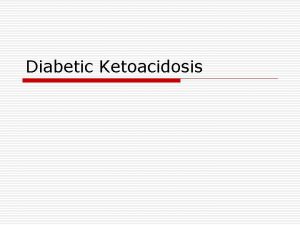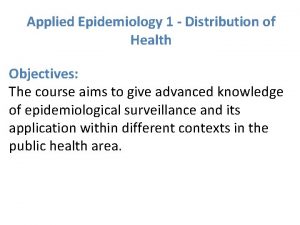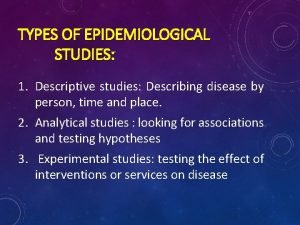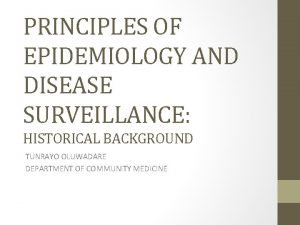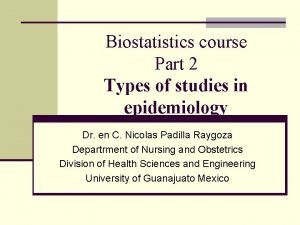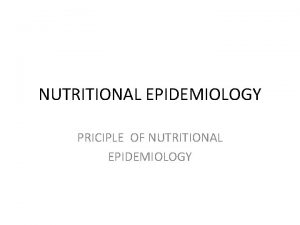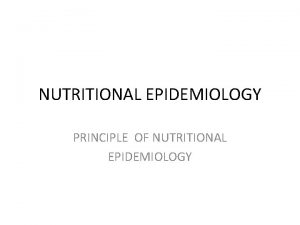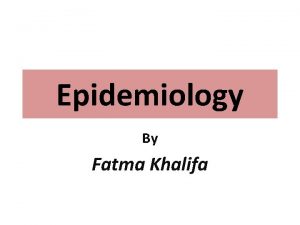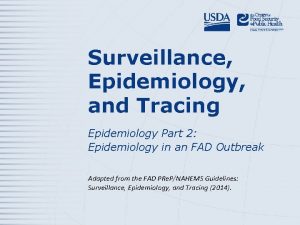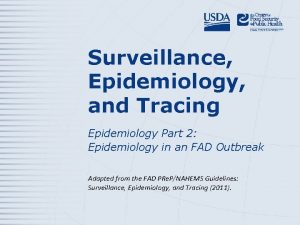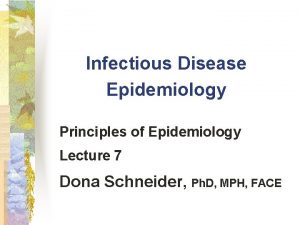NUTRITIONAL EPIDEMIOLOGY PRICIPLE OF NUTRITIONAL EPIDEMIOLOGY Principles of











- Slides: 11

NUTRITIONAL EPIDEMIOLOGY PRICIPLE OF NUTRITIONAL EPIDEMIOLOGY

Principles of Nutritional Epidemiology • Epidemiology is the branch of medical sciences which treat the outbreak of diseases. It is the study of the distribution and determinant i. e. risk factors of diseases frequency in human population and the application of the study to control health problems • Nutritional Epidemiology is the study of nutritional determinants of disease in human population. It focuses on relationship between our diet and health. It is an area of epidemiology that involve research into; Ø Examining the role of nutrition in the aetiology of disease. Ø Monitor the nutritional status of the population. Ø Develop and evaluate interventions to achieve and maintain healthy eating pattern among the population.

Goals of Nutrition Epidemiology Ø To contribute to the prevention of diseases (especially the nutrition related diseases) and improvement of public health Ø Monitoring of food consumption, nutrient intake and nutritional status of a population. Ø To generate hypothesis about diet and diseases. Ø To produce evidence that support or refute existing hypothesis and to access the strength of diet, disease association.


Types of Epidemiological Studies • Ecological or Correlational Studies • Compare the frequency of events in different populations with the per capita consumption of certain dietary factors. • Dietary data collected in this type of study are usually disappearance data, which are the figures for food produced for human consumption minus the food that is exported, fed to animals, wasted, or otherwise not available for human consumption. • Data from ecological studies cannot be used to draw conclusions about the role of foods or nutrients in the development of specific diseases, but they can be used to generate hypotheses which can then be tested with a more rigorous study design.

Types of Epidemiological Studies • Cross-sectional or Prevalence Studies Data are collected on the whole population at a single point in time to examine the relationship between disease and other variable of interest. It Examines the relationships among dietary intake, diseases, and other variables as they exist in populations at a particular time. • Case-Control Studies: Studies A group of people with a disease is compared with a group of people without the disease to compare characteristics, such as previous exposure to a factor, between cases and controls. Eg. Alcohol and vitamin deficiency • Cohort Studies-A Studies- group of people, called a cohort, free from the disease is identified and examined, and then followed for months or even years. Group members are examined periodically to determine which individuals develop the characteristics of interest and which do not Cohort studies may be either: Ø Retrospective : those that look back in time to reconstruct exposures and health outcomes, or Ø Prospective: those that follow a group into the future.


• Nature of epidemiological measurements ØThe relationships between diet and health at international, household and individual level ØConcepts of validity ØReproducibility ØCalibration ØBias and confounding

Nature of epidemiological measurements • One challenge to the study of the relationship of diet to disease is the nature of dietary variation and the complexity of our diets. • Concepts of validity-To say that the data are valid means that they are neither biased nor incorrect due to chance and that they represent the true state of affairs.

Nature of epidemiological measurements ØReproducibility- A study is reproducible if you take the original data and the computer code used to analyse the data and reproduce all the numerical findings from the study. ØCalibration- Calibration is a technique that corrects biases in situation where exposure variables are measured with error

Ø Bias and confounding - Bias may be defined as any systematic error in an epidemiological study that results in an incorrect estimates of the association between the exposure and risk of disease. Ø Confounding occurs when the effect of two associated exposures have not been separated resulting in interpretation that the effect is due to one variable rather than the other. The consequence of confounding is that the estimated association is not the same as the true effect. Observational studies are particularly susceptible to effects of bias and confounding.
 Marketing research process kotler
Marketing research process kotler Historical cost principle
Historical cost principle Define nutritional epidemiology
Define nutritional epidemiology Nutritional epidemiology
Nutritional epidemiology How dr. wafaa elsadr epidemiology professor
How dr. wafaa elsadr epidemiology professor Diabetic ketoacidosis epidemiology
Diabetic ketoacidosis epidemiology Thesourceagents
Thesourceagents Distribution in epidemiology
Distribution in epidemiology What is descriptive study in epidemiology
What is descriptive study in epidemiology John snow epidemiology
John snow epidemiology Pros and cons of cross sectional study
Pros and cons of cross sectional study How dr. wafaa elsadr epidemiology professor
How dr. wafaa elsadr epidemiology professor





